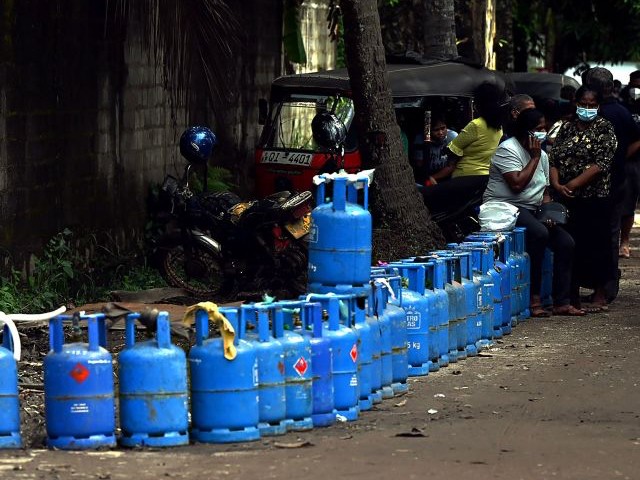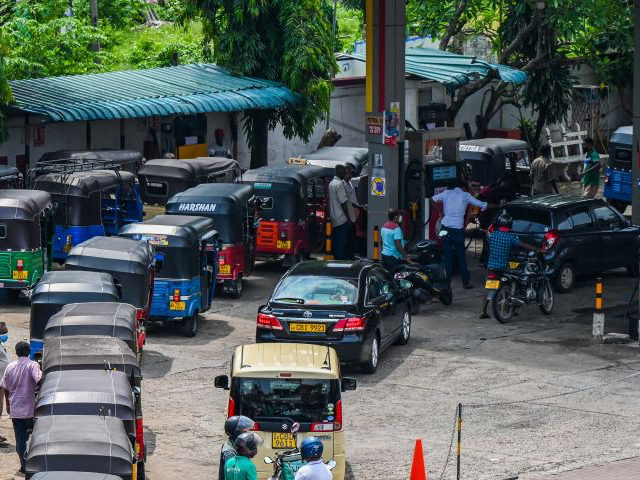Sri Lankan Prime Minister Ranil Wickremesinghe announced on Monday that his nation had “run out” of petroleum-based fuel during a national address in which he predicted that the next two months will be “the most difficult ones of our lives,” Agence France-Presse (AFP) reported.
“We have run out of petrol. … At the moment, we only have petrol stocks for a single day,” Wickremesinghe said on May 16.
The prime minister revealed his government had likewise run out of foreign currency reserves needed to pay for three oil shipments on vessels docked outside Colombo’s harbor on Monday and “14 essential medicines,” as paraphrased by Reuters.
“The next couple of months will be the most difficult ones of our lives,” Wickremesinghe told his fellow countrymen. “I have no desire to hide the truth and to lie to the public.”
The leader further acknowledged during his May 16 address that Sri Lanka’s federal government had run out of cash to pay its 1.4 million civil servants their salaries for the month of May and beyond.
“Against my own wishes, I am compelled to permit printing money in order to pay state-sector employees and to pay for essential goods and services,” the prime minister stated.
Wickremesinghe announced a number of economic reforms on Monday aimed at reducing the country’s financial losses, including plans to sell off the national airline carrier, Sri Lankan Airlines, and significantly raise fuel and electricity tariffs.
Sri Lanka’s Finance Ministry said on April 12 that it had approached the International Monetary Fund (IMF) for a bailout from its worst-ever financial crisis, which began causing fuel, medicine, and food shortages in early March.

People queue to buy Liquefied Petroleum Gas (LPG) cylinders in Colombo on April 11, 2022. (ISHARA S. KODIKARA/AFP via Getty Images)
“[O]ne of the key demands of the international lender [IMF] is for Colombo to divest loss-making state enterprises, including Sri Lankan Airlines whose carried-forward losses exceed a billion dollars,” AFP observed on May 16.
Some observers have pointed to the Chinese coronavirus pandemic as exacerbating debt woes, leading to Sri Lanka’s current foreign currency deficit. The island nation’s economy traditionally relied heavily upon revenue generated by tourism and remittances from citizens abroad. The pandemic cut Sri Lanka off from these two main sources of foreign exchange for two-plus years and precipitated Sri Lanka’s current financial crisis, according to some analysts.
People living in Sri Lanka felt the sting of the island’s money woes starting in early March when they began to translate into vital good shortages. Residents of the island who were increasingly frustrated with the shortages started to vent their anger toward Sri Lanka’s government by mid-March. Some factions of the island’s populace called for nearly all of Sri Lanka’s government to step down. The demonstrations gave way to rioting on the night of March 31 when a violent, hundreds-strong mob attempted to storm the personal residence of Sri Lankan President Gotabaya Rajapaksa in Colombo. Three days later, on April 3, nearly all of Sri Lanka’s Cabinet stepped down except for President Gotabaya Rajapaksa and then-Prime Minister Mahinda Rajapaksa, who is Gotabaya’s brother.
Incessant anti-government protests continued — both peacefully and violently — in Colombo through May 9 when the movement exploded into unprecedented acts of arson. Anti-government rioters set fire to more than 50 homes owned by current and former Sri Lankan government ministers, including several members of the Rajapaksa family. Mahinda Rajapaksa’s home was burned to the ground on the night of May 9 despite his resignation as prime minister hours earlier.

COMMENTS
Please let us know if you're having issues with commenting.